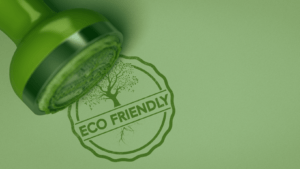Yes, greenwash matters to manufacturers too!
From March issue NZ Manufacturer www.nzmanufacturer.co.nz
‘Greenwashing is a marketing issue. What it’s got to do with manufacturers?’
A lot, actually. Many consumers (wholesale and retail) want to understand the environmental impacts of the products they buy – and every product is manufactured somewhere.
So the claims you make about your products to your customers, or that your customers make about your products to their customers, need to stand up to scrutiny.
Is my claim true? Is it accurate? Is it specific to my product? Can I prove it? Or is it ‘greenwash’ – a vague, meaningless statement that suggests you’re doing more to protect the environment than you are?
Greenwash is everywhere
In 2021 the International Consumer Protection and Enforcement Network carried out a global sweep of more than 500 websites that promote products and services. More than 40% appeared to be using greenwashing as a marketing tactic.

Photo credit, Christopher Wilton-Steer.
Scrutiny from consumer organisations and climate activists is growing globally and prosecutions continue to rise. Major retailers including H&M have been forced to backpedal on sustainability claims made about the products they sell.
The business costs of greenwash are high
Your manufacturing business has probably spent years and a lot of money building your reputation and brand. Look after them! Promising an ‘eco’ benefit that you can’t back up can damage both. (Social media is relentless.)
Regulators have greenwash in their sights. The financial penalties are large. Companies convicted of greenwashing face fines of up to $600,000 in Aotearoa New Zealand and more in Australia.
Eight tips to avoid greenwashing as a manufacturer
Tip 1: know your numbers
If you want to claim that your product is ‘low-carbon’ or ‘uses less water’, make sure you can back these statements up with data. Start by setting a baseline (where you are now). For example, carry out a Life Cycle Assessment (LCA) to understand your product’s environmental impacts (e.g. the greenhouse gases they emit).
An LCA measures impacts across every stage of a product’s lifecycle from the raw materials used to make it to its ‘end-of-life’.
Use this data to set targets to reduce your impacts (without increasing others), track your progress, compare your products with competitors’ products – and communicate credibly. No greenwash here!
Tip 2: tell the truth – the whole truth
Your claims must be truthful, accurate and specific. For example, if you state that your product is ‘made from recycled materials’, make sure you can specify how much of the materials were recycled. If you claim your product is ‘recyclable’, make sure the countries it is sold in have facilities to recycle it.
Context matters. Don’t cherry pick what you communicate (‘low-carbon packaging!) to draw attention from the ‘big issues’ (say, a product that contaminates local waterways).
Tip 3: speak your truth clearly
While marketing buzzwords like ‘natural’, ‘eco-friendly’, ‘green’ or ‘sustainable’ trip off the tongue, they’re too vague to be meaningful. (Arsenic is a ‘natural’ product too.) Use language that is simple, clear and precise.
Tools like Environmental Product Declarations (EPDs) will help you communicate clearly and credibly. Manufacturer Red Stag’s EPDs tell the environmental story of its timber products over their life cycles. EPDs use LCA data, meaning they are ‘science-based’.
They are independently verified, publicly available and follow a simple format that your customers can understand. EPDs are often compared with the nutrition labels on food products.
Tip 4: get a third-party certification
Consider a science-based, independent label or certification to help prove your environmental claims. There are many to choose from. Kawerau manufacturer Essity has gained Forest Stewardship Council® (FSC®) certification for its tissue products.
The Sustainable Business Network has a list of certifications relevant to businesses in New Zealand. If you sell to Australia, check out the Ecolabel Index.
Tip 5: compare with care
If you want to talk about your product being ‘the most sustainable on the market’ or ‘lower carbon’ than competitors’, you must be able to back this up. (There are rules for comparing LCA studies.)
Tip 6: delve into your supply chain
Before you make claims, check your supply chain. Don’t risk your reputation by associating with suppliers who deplete rare resources or practise modern slavery.
Tip 7: help your customers review their supply chains
Your customers may do due diligence on their suppliers too, including your business. Strengthen your relationship by showing them your data and certifications.
Tip 8: speak up!
The fear of being accused of greenwash can lead to ‘greenhush’ (saying too little). For example, some businesses making great strides to reduce their greenhouse gas emissions are unwilling to talk about their work.
If you’re becoming more sustainable and have data to prove it, share the good news! This will help you engage your team, suppliers and customers to make faster progress. You’ll also stand out from your competitors and attract customers and investors who share your values.



